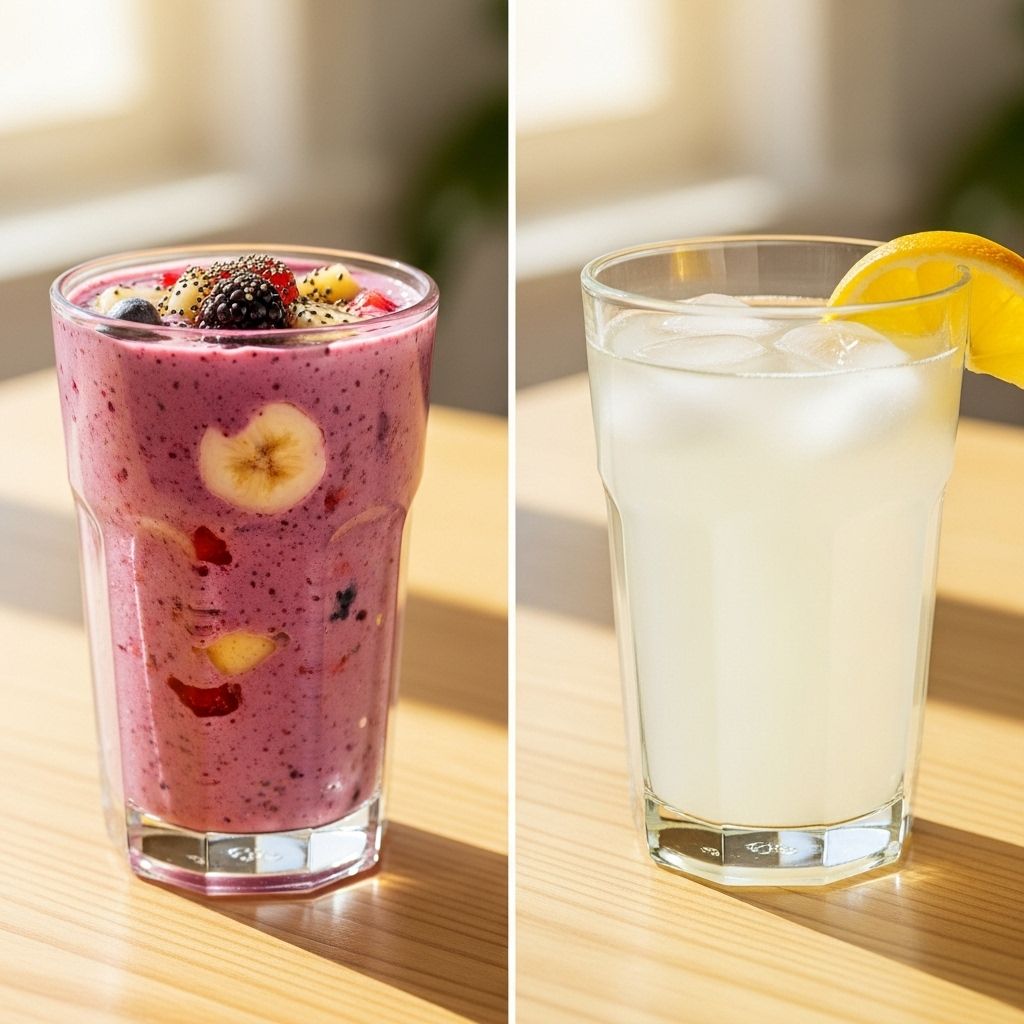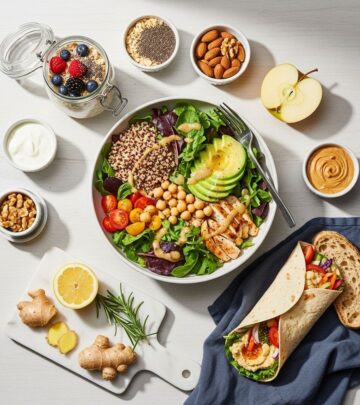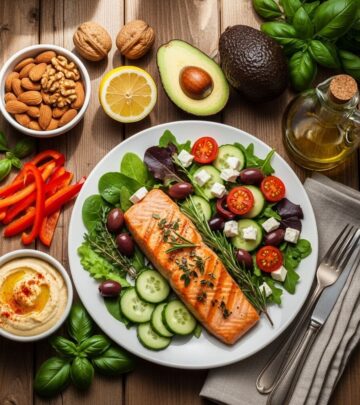Are Smoothies More Gut-Healthy Than Juice? Insights From a Gastroenterologist
Explore why fiber-rich smoothies may offer superior gut health benefits compared to juices, according to gastroenterology experts.

Are Smoothies More Gut-Healthy Than Juice? Gastroenterologists Weigh In
Smoothies and fresh juices are celebrated choices for boosting your intake of fruits and vegetables, but when it comes to supporting your digestive health and nourishing your gut microbiome, is one drink truly more beneficial than the other? Drawing from insights provided by gastroenterology specialists, along with a close look at the science of fiber, prebiotics, and probiotics, let’s dissect the differences and help you make the most gut-healthy choices for your daily routine.
Understanding Why Gut Health Matters
Your gut health is foundational to overall wellness. The digestive tract is home to trillions of microbes constituting your gut microbiome, which influences not only digestion but also immune health, inflammation, mental balance, and even metabolic processes. Improving the diversity and resilience of these beneficial bacteria is increasingly recognized as an essential aspect of preventive nutrition.
How Smoothies and Juices Differ: Key Points
While smoothies and juices both deliver a broad spectrum of nutrients, their impact diverges significantly when it comes to gut health—mainly due to differences in their fiber content and the presence of prebiotic and probiotic components.
| Beverage | Fiber Content | Prebiotics/Probiotics | Satiety | Blood Sugar Effect |
|---|---|---|---|---|
| Smoothie | High (whole produce used) | Can be rich (depending on ingredients) | Filling | Slower sugar absorption |
| Juice | Very low (pulp removed) | Low (unless specially fermented) | Less filling | Sharp sugar spike |
Fiber: The Crucial Difference for Gut Health
Fiber is widely acknowledged as key for a healthy digestive system. It adds bulk to stool, supports regular bowel movements, and serves as food for beneficial bacteria—making it a powerful prebiotic substance.
- Smoothies retain the entire fruit or vegetable, including the fibrous pulp and skin. This means they provide significantly more dietary fiber than juices, which can help regulate digestion and promote a healthier, more diversified microbiome.
- Juices filter out the pulp and fiber, concentrating vitamins but offering little in the way of prebiotics or digestive bulk.
- Example: A smoothie made with spinach, berries, apple, and chia seeds may contain 7–10 grams of fiber per serving—supporting bowel regularity and feeding a healthy microbiome.
In contrast, juices, even when made from the same fruits and vegetables, generally provide negligible fiber.
The Two Types of Fiber and Their Gut Benefits
- Soluble fiber (found in apples, carrots, oats) dissolves in water and forms a gel-like substance, slowing digestion and aiding blood sugar management.
- Insoluble fiber (in dark leafy greens, seeds, the skins of fruits/vegetables) adds bulk to stool, promoting regularity and preventing constipation.
Smoothies deliver both forms of fiber, making them more comprehensive for gut health compared to juice.
Prebiotics and Probiotics: Feeding and Seeding the Gut
What Are Prebiotics?
Prebiotics are certain dietary fibers that act as food for the beneficial bacteria living in your large intestine. Fruits, vegetables, whole grains, seeds, and legumes are especially rich in prebiotics.
- Smoothies, packed with whole plant foods, offer ample prebiotic fiber to support microbiome diversity and function.
- Juice lacks these fibers, so it does not support the microbiome in the same way.
What About Probiotics?
Probiotics are live beneficial bacteria you can add to your diet, supporting the balance of the gut microbiome. Certain foods—like yogurt, kefir, and naturally fermented beverages—supply natural probiotics.
- Smoothies can easily incorporate probiotic ingredients, such as yogurt or kefir, resulting in a drink that both introduces helpful microbes and supports them with prebiotic fiber (achieving a ‘synbiotic’ effect).
- Juices rarely include probiotics, unless they are deliberately fortified or fermented post-extraction.
Blood Sugar, Satiety, and Long-Term Health
Another critical consideration is how these beverages affect blood sugar levels and your sense of fullness (satiety).
- Smoothies, with their intact fiber, slow down sugar absorption in the gut. This reduces blood sugar spikes and supports more stable, sustained energy.
- Juices, deprived of fiber, can send a quick rush of simple sugars into your bloodstream, leading to rapid peaks—and subsequent crashes—in blood sugar.
- Smoothies are often far more filling, making it easier to avoid overeating later on.
For those concerned with cravings, metabolic syndrome, or diabetes risk, smoothies generally offer a safer and more balanced nutritional profile.
Gut Health and the Microbiome: A Science-Backed Comparison
Recent research reveals how greatly the composition and diversity of your gut microbiome can affect your well-being, with links to inflammation, immunity, mental health, and even weight management. Let’s compare how smoothies and juices impact this vital ecosystem.
- Smoothies provide high fiber and, when paired with probiotic ingredients, can have a synbiotic effect—where probiotics (beneficial bacteria) and prebiotics (their favorite food) work together for microbiome support.
- Juices deliver some vitamins quickly but lack fiber and fermentable substrate, so they do not nourish the microbiome over the long term.
While moderate juicing with mostly vegetables can be refreshing, it cannot match the gut microbiome benefits of a thoughtfully composed smoothie.
Are There Times Juice Is Preferable?
While smoothies tend to win for gut health, juices can have a role—especially when quick absorption is needed or in certain medical scenarios:
- During digestive distress or post-surgery, juice may be easier to tolerate because it lacks insoluble fiber, which can sometimes exacerbate symptoms.
- For hydration and micronutrient delivery to individuals with severely compromised digestion, juice (especially vegetable-based) might have a place.
- However, for most people and most situations, the fiber deficit and blood sugar impact limit juice’s appeal for gut wellness.
Environmental and Economic Considerations
Beyond personal nutrition, it’s worth noting the impact of juicing versus blending for the environment and your wallet:
- Juicing creates substantial food waste by removing and discarding the pulp—including valuable fiber, nutrients, and moisture.
- Smoothies use the entire fruit or vegetable, making for a less wasteful and more sustainable food-preparation method.
- Though smoothies may require a slightly higher up-front investment due to diverse ingredients, the increased nutrient density and reduced food waste mean better value over time.
How to Build a Gut-Healthy Smoothie
Want to maximize digestive and microbiome benefits? Follow these gastroenterologist-backed tips:
- Start with high-fiber fruits and vegetables: Berries, apples (with skin), pears, spinach, kale, carrots.
- Add prebiotic boosters: Oats, ground flaxseed, chia seeds, inulin-rich foods like bananas or asparagus.
- Include a probiotic base: Use yogurt, kefir, or plant-based fermented alternatives for a symbiotic blend.
- Mix in healthy fats and proteins: Nut butters, avocado, hemp seeds—these help slow sugar absorption and promote satiety.
- Limit added sugars: Choose naturally sweet produce over syrups or sweetened juice bases.
- Watch serving size: Even healthy smoothies are calorie-dense—enjoy reasonable portions for balanced nutrition.
Expert Recommendations: Smoothies vs. Juices
- Pick smoothies for digestive and metabolic health: Their blend of fiber, micronutrients, and gut-supportive bacteria make them ideal for daily consumption.
- Reserve juice for special cases: Vegetable-based juices, in moderation and with meals, can supplement your intake but shouldn’t replace whole foods or fiber-rich beverages.
- Aim for variety: Occasionally rotate ingredients and preparation methods—your gut bacteria like diversity!
Hydration and Electrolyte Balance
Contrary to popular belief, smoothies can be just as hydrating as juices, especially when made with water, coconut water, or ice as the base. Including potassium-rich ingredients (banana, avocado, leafy greens) will also help maintain healthy electrolyte levels, making smoothies a solid choice for post-workout recovery or warm-weather refreshment.
FAQs: Smoothies, Juices, and Gut Health
Q: Is juicing ever better for gut health than smoothies?
A: For most people, smoothies are superior for gut health due to their intact fiber and prebiotic content. Juice can fill a need when fiber needs to be restricted, but it doesn’t provide the same microbiome-supporting benefits.
Q: What smoothie ingredients best support the gut microbiome?
A: High-fiber fruits and vegetables (such as berries, apples, leafy greens), prebiotic-rich foods (flaxseed, oats, inulin foods), and probiotics (yogurt, kefir) together optimize gut flora growth.
Q: How much sugar is too much in a smoothie or juice?
A: Limit added sugars entirely, and moderate use of high-sugar fruits. Combining fruits with fiber, protein, and fat dampens blood sugar spikes, while vegetable-heavy blends are lower in sugar overall.
Q: Can you use juices as a meal replacement?
A: Generally no, because juice lacks fiber and protein. Smoothies—with fiber, protein, and healthy fats—make more complete and satisfying meal options.
Q: How often should I drink a smoothie for gut health?
A: A daily fiber-rich smoothie can support digestion and microbiome diversity, but variety in your diet is also key for optimal gut health.
Key Takeaways
- Smoothies outperform juices for gut health due to their higher fiber and prebiotic content.
- Adding probiotic sources to smoothies (yogurt, kefir) further enhances their microbiome-supporting power.
- Smoothies support digestive regularity, balanced blood sugar, and greater satiety.
- If you wish to juice, favor mostly vegetables and pair with meals to temper sugar absorption.
- The most sustainable choice—for your health and the environment—remains the whole-food, blended smoothie.
Read full bio of medha deb












